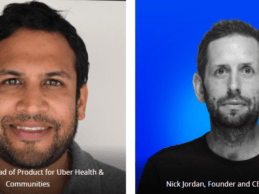There's no question that the demand for telehealth and virtual care has grown exponentially over the last twelve months. With that growth has come a fundamental shift in the attitude toward virtual care. No longer do patients and providers take a "let's try it" approach—now, it's "we must do it." This is evidenced by the number of telehealth claims filed. In 2020, telehealth claims skyrocketed, increasing by 2,938% in November 2020 versus November 2019 as patients demanded virtual options and as
Read More
Health IT & Digital Health-Opinion | Op-Eds | Guest Columns | Analysis, Insights - HIT Consultant
Key Lessons from COVID-19 & How We Can Better Support our Healthcare Provider
COVID-19 has been a novel pandemic in many ways beyond the actual virus itself – from the irreparable impacts it’s having on society, to the immense strain it’s put on the healthcare industry. A recent report stated that 93% of healthcare professionals reported experiencing stress, 86% reported experiencing anxiety, and 76% reported exhaustion and burnout [1]. Considering that the virus will continue to have an impact in 2021 and the reality that COVID-19 will likely not be the last epidemic we
Read More
Biospecimen Procurement for R&D Needs to Look More Like an Online Marketplace
As healthcare digitizes everything from insurance claims to clinical decisions, some functions remain frustratingly analog, old school, and inefficient.
One such function is the distribution of human biospecimens necessary for medical research. Specimens are essential in providing much of the data that researchers examine, EHRs capture, and scientific databases aggregate. Unfortunately, the distribution of specimens and their data to researchers is woefully outdated and inefficient. Frankly,
Read More
Boost Operational, Clinical and Financial Performance with Good Data
There’s an old adage that every challenge is merely an opportunity in disguise. COVID-19 highlighted the healthcare industry’s ongoing challenge with producing clean, standardized data. As the industry looks to rebound from the severe financial impact of the pandemic, there’s a renewed urgency among hospitals and health networks to improve operational efficiency.
The push toward greater operational efficiency – in a time of constrained budgets and resources – has accelerated
Read More
COVID Exposed The Dire Need for Real-Time Healthcare Data Sharing
In a world where technology and Big Data can provide us with instantaneous access to our banking transactions, and our financial information and credit reports can be retrieved with a few keystrokes when applying for a mortgage -- trying to get access to our own healthcare data is exasperating. Beyond exasperating, is the frightening situation when the inability to access up-to-date and accurate information, can result in an aggravated medical condition or even death.
Before the
Read More
3 Barriers Stalling AI Adoption in Revenue Cycle Management
AI technology is quickly evolving and already surpassing human decision-making in certain instances; sometimes, in ways, we can’t explain. While many are alarmed by this, AI is producing some of the most effective and dramatic results in business today.
Adoption of AI in healthcare is growing, but there are still barriers to overcome
AI can be defined in many ways but, broadly, it is the ability of a machine to perform cognitive functions we associate with human minds, such as
Read More
Next-Generation Cloud Storage: Enabling Collaboration & Analytics for Pharma Research
Pharmaceutical companies today are distributed, global organizations, with research centers, manufacturing facilities, and regulatory management hubs spread all over the globe. To develop new treatments and bring them to market, all of these different functions need to collaborate more closely than ever. Using traditional, on-premises storage technologies, however, makes it difficult to share data quickly and securely, especially given that the research and manufacturing process can generate
Read More
To Advance Health Equity, Put Real-World Cancer Data to Work
Despite decades of scientific progress against cancer, access to treatment remains highly unequal. Some of the reasons — like institutional racism and poverty — are a reflection of our broader society. Other inequities may go unrecognized but are no less damaging. People with underlying health conditions, for example, may be excluded from clinical trials, preventing them from accessing leading-edge treatments and limiting the evidence available to guide their care.
With multiple drivers of
Read More
Why Families Need the Closure Whole Genome Sequencing Provides
For medical practitioners expertly trained in the scientific methods of discovery, having a young patient with serious health complications from an undiagnosed condition is about as somber and frustrating as it gets. These feelings are only magnified for parents of the patient, especially when searching for a diagnosis can go on for years. This is the essence of what is known as the “diagnostic odyssey.”
Honing in on a rare disease diagnosis involves thorough medical history evaluations,
Read More
How the Pandemic is Accelerating the Shift to Alternative Care Delivery Models
The COVID-19 pandemic has transformed how we interact with one another, with businesses, and with the world around us. From social distancing to hand sanitation to remote working, its impact on society is immense. And among the various industries that are experiencing significant change as a result of the pandemic, healthcare tops the list. Supply chain disruptions, crowded ICUs and exhausted medical staff has taken a toll on hospitals and clinics — and they’ve had to pivot rapidly to new
Read More










